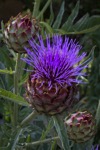| Scientific: | Cynara cardunculus |
|---|---|
| Other: | Globe artichoke |
| Family: | Asteraceae |
| Synonym: | Cynara scolymus |
Artichoke grows in the Mediterranean region where this pleasantly bitter vegetable is consumed as a gourmet food. This liver herb is used for digestive disorders and to prevent heart disease.
Research confirms artichoke lowers cholesterol and triglycerides by decreasing their production in the liver. Also, artichoke increases the production and release of bile to assist with lipid metabolism and digestion. In addition, artichoke is rich in antioxidants that helps reduce free radical damage that leads atherosclerosis.
The bitter taste of artichoke is attributed to the sesquiterpene lactone cynaropicrin. Although significantly less bitter than some herbs like Gentian, the artichoke is a valuable herb in dyspeptic conditions associated with heaviness, poor appetite, nausea, stomach pain, and constipation. Artichoke also has documented prokinetic effects to increase intestinal motility and also antispasmodic properties to decrease cramping pains. Research suggests it can improve pain associated with irritable bowel syndrome.
The liver also receives benefit from the consumption of milk thistle. Historically it was used for hepatitis and jaundice. Some of its constituents have hepatoprotective effects, and research suggests it aids fatty liver disease.
Cardiovascular
• hyperlipidemia
• hypercholesterolemia
• atherosclerosis
- coronary artery disease (CAD)
Gastrointestinal
• atonic digestive complaints
• dyspepsia
• hypochlorhydria
• pancreatic insufficiency
• colic
• biliary insufficiency
• cholestasis
• cholelithiasis (gallstones)
• jaundice
• biliary dyskinesia
• non-alcoholic fatty liver disease (NAFLD)
Musculoskeletal
• chronic rheumatism
• arthritis
• gout
• Antihyperlipidemic
• Bitter
• Stomachic
• Hepatic
• Cholagogue
• Choleretic
• Hepatoprotective
• Prokinetic
• Laxative (Mild )
• Sesquiterpene Lactones (E.g. Cynaropicrin)
• Phenoilc Acids (E.g. Cynarine, Caffeic Acid)
• Phytosterols (E.g. Taraxasterol)
• Flavonoids
• Liquid extract (1:2): 1-3 ml tid
• Tincture (1:5 25% EtOH): 1-3 ml tid
• Decoction (dried root): 1-3 g tid
Generally considered safe when used as indicated.
Contra-Indications:
• gastritis & stomach ulcers
• obstructed gallbladder
Caution:
• Asteraceae allergy: contains sesquiterpene lactones
Pregnancy & Lactaction:
• Unsure. Probably safe.
Barnes J, Anderson LA, Phillipson JD. Herbal Medicines, 3rd ed. London: Pharmaceutical Press, 2007.
Bone K. Principles and Practice of Phytotherapy. Edinburgh: Churchill Livingstone, 2000.
Bone K. A Clinical Guide to Blending Liquid Herbs: Herbal Formulations for the Individual Patient. St Louis, MO: Churchill Livingstone, 2003.
Brinker F. The Toxicology of Botanical Medicines, 3rd ed. Sandy, Oregon: Eclectic Medical Publications, 2000.
Felter HW, Lloyd JU. King's American Dispensatory. 1898. http://www.ibiblio.org/herbmed/eclectic/kings/main.html. Accessed: August 19, 2006.
Hoffman D. Medical Herbalism. Rochester, Vermont: Healing Arts Press, 2003.
Weiss RF. Herbal Medicine. Beaconsfield, England: Beaconsfield Publishers Ltd, 1988.
Williamson EM, ed. Major Herbs of Ayurveda. Edinburgh: Churchill Livingstone, 2002
Disclaimer: This content is subject to change. The information is intended to inform and educate; it does not replace the medical evaluation, advice, diagnosis or treatment by a healthcare professional. www.nhpassist.com © 2014 NDAssist Inc. and/or its affiliates. All rights reserved.

|
Artichoke (Globe )
SummaryArtichoke grows in the Mediterranean region where this pleasantly bitter vegetable is consumed as a gourmet food. This liver herb is used for digestive disorders and to prevent heart disease. IndicationsSign in requiredActionsSign in requiredConstituentsSign in requiredPosologySign in requiredSafetySign in requiredReferencesSign in required |
|---|